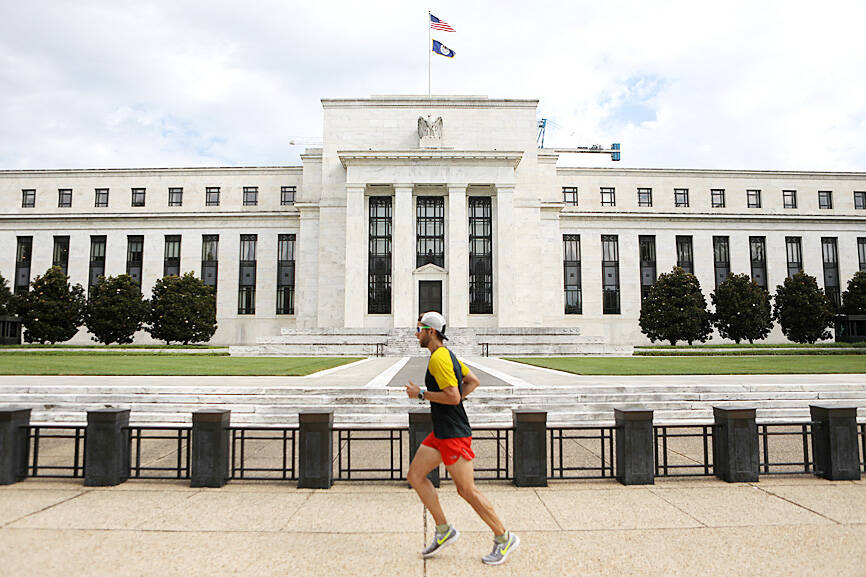US Federal Reserve Bank of Chicago President Austan Goolsbee on Thursday described the latest US inflation data as “excellent,” adding that the figures provided the evidence he had been waiting for to be confident the US central bank is on a path to its 2 percent goal.
Goolsbee declined to offer guidance on the timing of the first interest rate cut. Still, he emphasized the importance of the deceleration in shelter inflation in the past few months, calling it “profoundly encouraging.”
He has been closely watching that category to determine when the US Fed should lower borrowing costs.

Photo: Reuters
“The committee put out a statement saying, we would not anticipate cutting rates until we were more convinced we’re on a path to 2 percent,” Goolsbee told reporters. “My view is this is what the path to 2 percent looks like.”
Goolsbee’s comments follow a report earlier on Thursday that showed the consumer price index rose 3 percent from a year ago last month, a slowdown from 3.3 percent in May and the slowest pace since August 2021.
The slowdown was partly driven by a long-awaited cooling in housing costs, a component Goolsbee has said would be key to achieving the Fed’s inflation goal.
Following the data, which showed disinflation across a variety of categories, investors all but cemented bets that the Fed would cut rates at a meeting in September.
Policymakers are to meet on July 30 and 31.
Goolsbee, who is to vote at the Fed’s meeting later this month as an alternate member of the US Federal Open Market Committee, said that by not adjusting rates, the central bank is effectively tightening policy.
“The reason to tighten in real terms would be if you thought the economy is overheating,” he said. “This is not, in my view, what an overheating economy looks like.”
Two other policymakers also spoke following the latest consumer price index data.
San Francisco Fed President Mary Daly said that given recent data on employment and inflation, some adjustment to interest rates would likely be warranted — although she stopped short of offering a specific timeline for cuts.
St Louis Fed President Alberto Musalem said that he needed some more convincing to lower borrowing costs.
Musalem said that the CPI figures pointed to “encouraging further progress towards lower inflation,” but he would like more evidence of easing price pressures.
While Goolsbee’s comments signal that he is ready for a rate cut soon, he said he probably would not dissent in favor of one at the meeting this month should his fellow policymakers vote to hold rates unchanged.
Goolsbee said he is open to one rate cut followed by a pause or a series of reductions, underscoring the path of interest rates would depend on the inflation data.

SEEKING CLARITY: Washington should not adopt measures that create uncertainties for ‘existing semiconductor investments,’ TSMC said referring to its US$165 billion in the US Taiwan Semiconductor Manufacturing Co (TSMC, 台積電) told the US that any future tariffs on Taiwanese semiconductors could reduce demand for chips and derail its pledge to increase its investment in Arizona. “New import restrictions could jeopardize current US leadership in the competitive technology industry and create uncertainties for many committed semiconductor capital projects in the US, including TSMC Arizona’s significant investment plan in Phoenix,” the chipmaker wrote in a letter to the US Department of Commerce. TSMC issued the warning in response to a solicitation for comments by the department on a possible tariff on semiconductor imports by US President Donald Trump’s

‘FAILED EXPORT CONTROLS’: Jensen Huang said that Washington should maximize the speed of AI diffusion, because not doing so would give competitors an advantage Nvidia Corp cofounder and chief executive officer Jensen Huang (黃仁勳) yesterday criticized the US government’s restrictions on exports of artificial intelligence (AI) chips to China, saying that the policy was a failure and would only spur China to accelerate AI development. The export controls gave China the spirit, motivation and government support to accelerate AI development, Huang told reporters at the Computex trade show in Taipei. The competition in China is already intense, given its strong software capabilities, extensive technology ecosystems and work efficiency, he said. “All in all, the export controls were a failure. The facts would suggest it,” he said. “The US

The government has launched a three-pronged strategy to attract local and international talent, aiming to position Taiwan as a new global hub following Nvidia Corp’s announcement that it has chosen Taipei as the site of its Taiwan headquarters. Nvidia cofounder and CEO Jensen Huang (黃仁勳) on Monday last week announced during his keynote speech at the Computex trade show in Taipei that the Nvidia Constellation, the company’s planned Taiwan headquarters, would be located in the Beitou-Shilin Technology Park (北投士林科技園區) in Taipei. Huang’s decision to establish a base in Taiwan is “primarily due to Taiwan’s talent pool and its strength in the semiconductor

French President Emmanuel Macron has expressed gratitude to Hon Hai Precision Industry Co (鴻海精密) for its plan to invest approximately 250 million euros (US$278 million) in a joint venture in France focused on the semiconductor and space industries. On his official X account on Tuesday, Macron thanked Hon Hai, also known globally as Foxconn Technology Group (富士康科技集團), for its investment projects announced at Choose France, a flagship economic summit held on Monday to attract foreign investment. In the post, Macron included a GIF displaying the national flag of the Republic of China (Taiwan), as he did for other foreign investors, including China-based